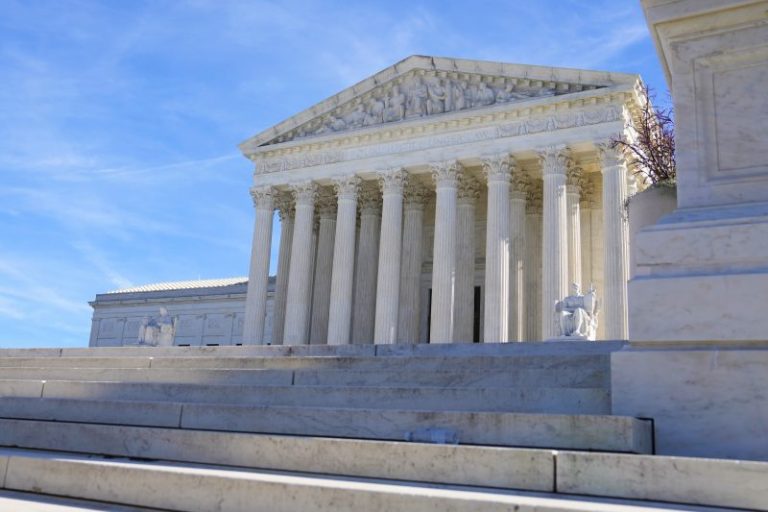The Supreme Court on Monday seemed likely to impose new restrictions on federal prosecutors battling public corruption, with the justices skeptical about the convictions of two men who profited in influence peddling during the administration of former New York Gov. Andrew M. Cuomo (D).
The justices questioned whether Joseph Percoco could be convicted of depriving the public of his “honest services,” given that he was working for Cuomo’s reelection campaign — rather than in his former role as an aide to the governor — when he accepted $35,000 in payments from a construction company. Percoco made calls to state officials on the company’s behalf just before returning to government employment.
But using one’s political influence as a private citizen is basically just being a lobbyist, Justice Neil M. Gorsuch said, and “this town is full of such persons.”
Chief Justice John G. Roberts Jr. told Nicole F. Reaves, a Justice Department lawyer defending Percoco’s conviction, that the government’s arguments for prosecuting a person who does not hold public office “sounds like … an effort to break down the concept of political power.”
Justice Clarence Thomas added it was “rather odd” that the federal government, rather than New York state, was going after Percoco. “If New York actually wanted to prosecute this activity, it had the authority to do so and the statutory basis for it,” he said.
The Supreme Court has become increasingly wary of federal prosecutors pursuing public officials for behavior that some justices have considered the normal activity of politics.
In 2016, the court threw out the conviction of former Virginia Gov. Bob McDonnell (R) and his wife for accepting gifts in return for promoting a benefactor’s business, saying McDonnell would have had to take specific government actions on behalf of the benefactor for the behavior to be illegal. More recently, it overturned the convictions of two allies of former New Jersey Gov. Chris Christie (R) for closing the George Washington Bridge to punish one of the governor’s rivals.
Yaakov M. Roth, Percoco’s lawyer, said his client “took no oath of public office” while working on the campaign and “possessed no legal authority to bind the state or make decisions for it.” What he did have, Roth said, “was influence, in his case, influence drawn from years of public service, from a close relationship to the Cuomo family, and from his senior campaign role.”
But some justices still expressed concern. Though Percoco resigned as Cuomo’s deputy to run his reelection campaign, he maintained an office in the governor’s suite and attended official meetings. He took the payment from the construction company while campaign manager, but called a state official days before returning to state employment to tell him to drop a requirement that the company negotiate a labor peace agreement.
Percoco was sentenced to six years in prison after his conviction of charges including depriving the public of the “intangible right to honest services.”
Justice Elena Kagan told Roth that “the theory of your case is basically, as long as he wasn’t in public office, you can’t charge him under this statute.” That theory could provide a blueprint for corruption, Kagan said. She speculated about a public official who “resigns his office every time he wants to take a bribe and then picks up his office again when he’s completed the bribe. And there has to be something wrong with that.”
Roth replied that prosecutors must show “a nexus to official power” to prove corruption. “That needs to be what the deal contemplates, that you are selling your official power.” At the time Percoco accepted payment from the company, Roth said, he did not know he would be returning to state government.
Reaves said Percoco’s arguments were based on a “caricature” of the facts.
“While functioning as a government official and after he had decided to return to formal government employment, [Percoco] accepted multiple bribes in exchange for commanding a government agency to reverse a final decision,” Reaves said.
She said the government has a three-part test to define what it means to be “functioning” as a government official: acquiescence by others in the government to treat the person as an official; an ability to command government employees to take specific government acts; and additional indications of a government role. In Percoco’s case, Reaves said, the latter includes keeping his office in a government building and attending government meetings.
Gorsuch and others were not convinced. “I’m wondering” where such a test comes from, Gorsuch said. “It’s certainly not in the text” of the law.
Justice Ketanji Brown Jackson said she was concerned that Reaves said it was not an essential part of the test that the person return to government employment. “If the person is just sort of lingering as a result of their former engagement, why isn’t that just a lobbyist?” she asked.
In a separate case, the court considered the bid-rigging conviction of Louis Ciminelli and others who won a $750 million development contract as part of Cuomo’s Buffalo Billion revitalization project.
The justices were skeptical of how the case was prosecuted, under a theory approved by the U.S. Court of Appeals for the 2nd Circuit. Its “right to control” theory of fraud treats the deprivation of complete and accurate information as a kind of property fraud.
Justice Department lawyer Eric J. Feigin acknowledged that “it’s an awkward fit with property fraud as it’s been traditionally understood.” He tried to convince the justices that it was possible to convict Ciminelli under a new theory based on the facts already presented to a jury. Gorsuch and Jackson, in particular, seemed doubtful.
Ciminelli’s lawyer Michael R. Dreeben, a former career attorney in the U.S. solicitor general’s office, said no new theory should be allowed.
“The only proper judgment is a judgment of acquittal,” Dreeben said, adding that if the theory used by prosecutors fails, “so does this conviction.”
The cases are Percoco v. United States and Ciminelli v. United States.

